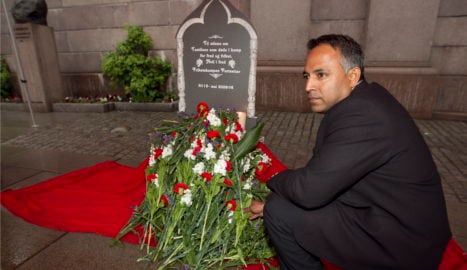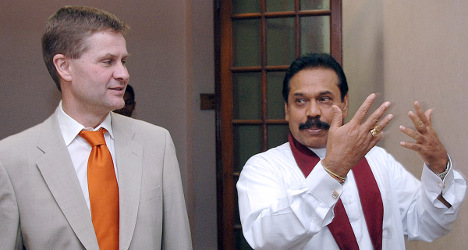SRI LANKA
Sri Lanka demands arrest of suspected Tamil Tiger
Sri Lanka's government has sent out an alert demanding that Norway's government arrest Perinpanayagam Sivaparan, an Oslo-based Tamil, claiming that he is the new leader of the militant Liberation Tigers of Tamil Eelam (LTTE).
Published: 24 April 2014 12:07 CEST

Panchakulasingam Kandiah, leader of Norway's National Council of Eelam Tamils, kneeling in front of a tombstone set up outside Norway's to symbolise the killing of Tamils in Sri Lanka. Photo: Heiko
According to an article in the pro-government Sunday Observer newspaper, Sri Lankan police earlier this month issued "red notices", effectively an international arrest warrant, for 40 members of the LTTE, including for Sivaparan.
Morten Høglund, the incoming State Secretary in Norway's Foreign Ministry, told state broadcaster NRK that the foreign ministry was still evaluating how to respond to the approach.
So far, Sivaparan's name does not appear on the Interpol database.
Norway briefly arrested Sivaparan in Oslo in 2011, interviewing him over his role in financing operations for the LTTE among the Tamil diaspora in The Netherlands and then releasing him on conditional bail.
But while the five Dutch Tamils were in October 2011 jailed for six months by a court in The Hague for raising money for an organisation on the European Union's banned list, Sivaparan has not been called back by Norwegian police.
Sri Lanka has been increasing its pressure on its restive Tamil minority this year, at the start of this month claiming to have killed three LTTE activists, in the first gun battle since the long-running civil war in Sri Lanka ended five years ago.
Sri Lanka's government believes that Tamil activists are trying to revive the LTTE, which waged a 26-year struggle to establish a separate Tamil state in northern Sri Lanka until it was defeated in 2009.
Url copied to clipboard!


 Please whitelist us to continue reading.
Please whitelist us to continue reading.
Member comments